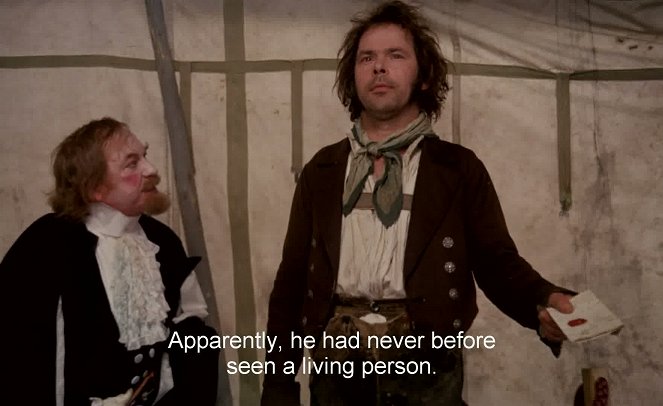Regie:
Werner HerzogScenario:
Werner HerzogCamera:
Jörg Schmidt-ReitweinActeurs:
Bruno S., Walter Ladengast, Brigitte Mira, Herbert Achternbusch, Reinhard Hauff, Enno Patalas, Helmut Döring, Clemens Scheitz, Kidlat Tahimik (meer)Samenvattingen(1)
Het is een raadselachtig verhaal: op een dag wordt in een van de straten van Nürnberg een jongeman gevonden, gestoken in lompen, die niet kan spreken of lezen. In zijn hand een brief met zijn naam, Kaspar Hauser (Bruno S.). Kaspar wordt als freak tentoongesteld in het circus – in 1828 gaat men niet zachtzinnig om met mensen die afwijken van de norm -, totdat de geleerden zich over de jongen buigen. Ze willen de mens in de natuurstaat bestuderen: heeft hij een godsbegrip? Moreel besef? En hoe snel kun je iemand die in een kelder is gehouden, gevoed door een man met een masker voor, socialiseren? (EYE Film)
(meer)Recensie (1)
This film would not work as a psychological sociological study (which Herzog certainly did not try to do) because who would believe that a person who was supposed to be tied up in a basement until the age of 16 would not learn to walk, speak, and think within a few years... (for example, Truffaut's The Wild Child (1970) or Mockingbird Don't Sing (2001) in relation to this topic). However, similarities between human life in general can be traced in the film, although it is quite paradoxical considering the very individual fate of Kaspar Hauser. Indeed, we are all thrown into our lives by someone without our contribution, without our choice, and without knowledge. Society then tells everyone how to perceive and explain the world around them, and it tries to adapt each person to its own image so that they correspond to its "protocol" (Kaspar is born for society only when he appears in the middle of Nuremberg square, or when he is brought to the house of the officer, and from that moment until the end, the protocol of his life is created). And just as he was thrown defenselessly into the world, he is just as insidiously, gratuitously, and arbitrarily thrown out of it by the same person.
()

